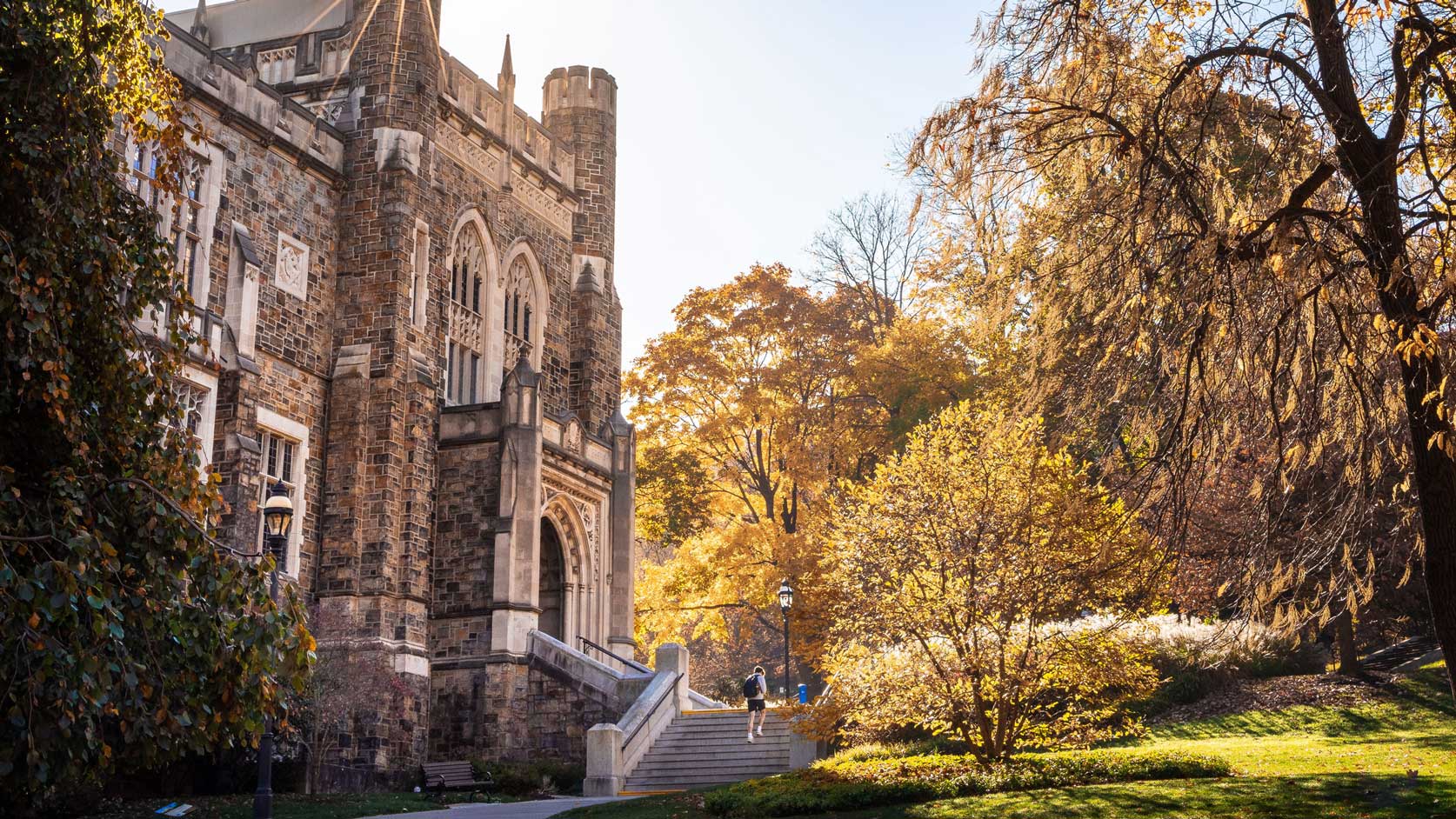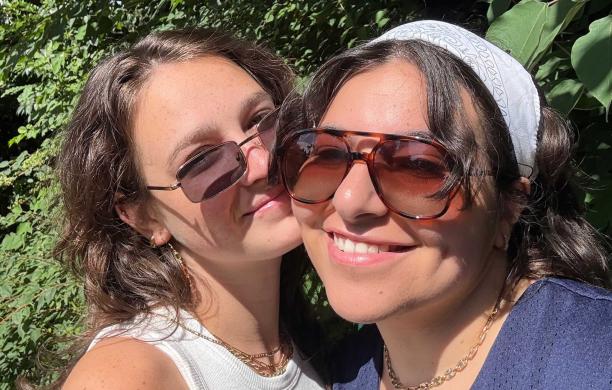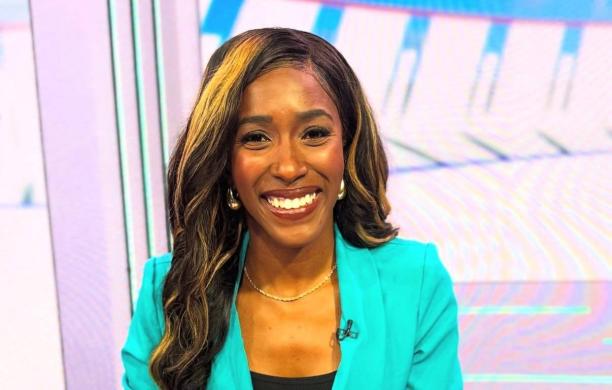Some alumni leave South Mountain and then move mountains in less than a decade.
It’s one of the factors that helps them land on our list of 10 Under 10 — 10 alumni who graduated in the past 10 years and have advanced their field, accomplished lots, earned accolades, and/or made a global impact.
The 10 featured here were nominated and selected by their peers and members of the Lehigh Young Alumni Council. In addition to their achievements, nominees were also engaged in the Lehigh community, demonstrated outstanding character, and/or created a positive impact in the community.
Meet the 2024 10 Under 10
Rachel Sholder ’16 ’17G | Jonathan Jean-Pierre ’15 | Nadine Clopton ’19 ’20G | Jamal Connelly ’19 | Adam Goldstein ’16 ’17G | Julia Pardee ’21 | Dean Kroker ’16 | Deanna Kocher ’17 | Diana Nicholas ’19 | Mimi Bestwick ’14
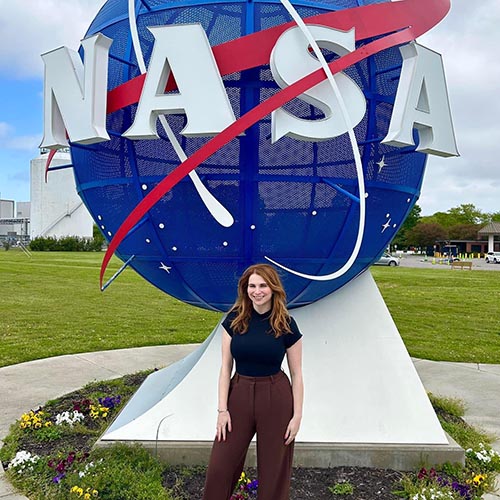
Rachel Sholder ’16 ’17G
Mathematics and Statistics
When a sheet with the words “Lafayette’s President Uses Myspace” hung out a window at the President’s House in 2016 during Rivalry Week, it had Sholder’s fingerprints all over it. At the time, she was earning her master’s degree in statistics and working as a graduate assistant in the President’s Office, helping a new president connect with students through outreach events. A playful jab to the rivalry president earned the Lehigh president some props (and was his most liked Instagram post to date). To this day, they continue to talk on the phone and regularly meet for meals.
Let’s say she has a talent for taking the lead. It started on stage. By age three, Sholder began her dance training. Vocal lessons soon followed. By five, she was earning roles in productions. Her off-Broadway debut came as a young teenager. But while she may have had lasting success on stage, she had other things to accomplish and Lehigh in her sights.
Sholder started on South Mountain and dove right into her academics and extracurriculars. Besides working toward a bachelor’s degree in mathematics, she participated in sorority recruitment and joined Alpha Gamma Delta, becoming an active member before leading and running her sorority by serving on the executive council for two years. An interest in public health had her help form and then lead the Peer Health Advisors — students trained to help advance the health and safety of Lehigh students. In addition to her sorority involvement and being the president of the Peer Health Advisors, Sholder also held three jobs on campus and served on various committees. These jobs and roles were all within student affairs and the Office of the Dean of Students. Sholder thoroughly enjoyed her extracurriculars, which were all aimed at improving the quality of student life at Lehigh.
As a graduate student, she focused on a short list of employers when she attended the fall career fair. By November of her graduate year, Sholder had secured a position at Johns Hopkins University Applied Physics Lab (JHU/APL), the nation's largest university-affiliated research center (and workplace to nearly 60 Lehigh alumni). APL provides government agencies (such as the U.S. Navy, the Department of Defense, NASA, the Missile Defense Agency, and the Department of Homeland Security) with expertise in various science and engineering fields to support national priorities and technological advancements.
Since graduating from Lehigh, Sholder has been working in APL’s Space Exploration Sector in the Space Systems Engineering group. Her primary role has been as a cost analyst for NASA mission concepts and NASA missions in development. She has also explored other systems engineering roles. Most notably, she worked as a fault management systems engineer on NASA’s first planetary defense mission, Double Asteroid Redirection Test (DART). DART was the first-ever mission (and only mission thus far) to successfully demonstrate that an asteroid’s motion in space can be changed through kinetic impact, with the DART spacecraft slamming into the asteroid and changing the asteroid’s trajectory.
Since June 2022, Sholder has maintained her role within the space sector, but she also explored her interest in public health through COVID-19-related work with sponsors such as the Centers for Disease Control and Prevention and U.S. Department of Health and Human Services. Since starting her professional career at APL, Sholder has published 10 academic papers and presented this work at conferences throughout the U.S. In April 2023 at a NASA conference, Sholder was awarded and named “NASA’s Rising Star.”
At the same time, she is a doctoral student (soon to be a doctoral candidate) at Johns Hopkins University with Lauren Gardner as her adviser — the brains behind the JHU COVID-19 Dashboard, which earned Gardner a spot on TIME’s 100 Most Influential People of 2020. Sholder’s dissertation will be in the applied mathematics and statistics field with a focus on infectious disease modeling.
That goal is fun but maybe not as fun as visiting every national park in the U.S. By the end of summer, Sholder will have visited 48 of the 63.
Most fun? Her work for Lehigh. She leads the Baltimore Alumni Club, has been a member of the Young Alumni Council for six years, chaired the Class of 2016 five-year reunion committee, and attends the Lehigh Career Fair to recruit the next great talent for APL. At her five-year reunion, Sholder was the Alumni Award recipient for the Class of 2016, an award given to the individual who has provided continued support to the university and has contributed significantly to the life of their community.
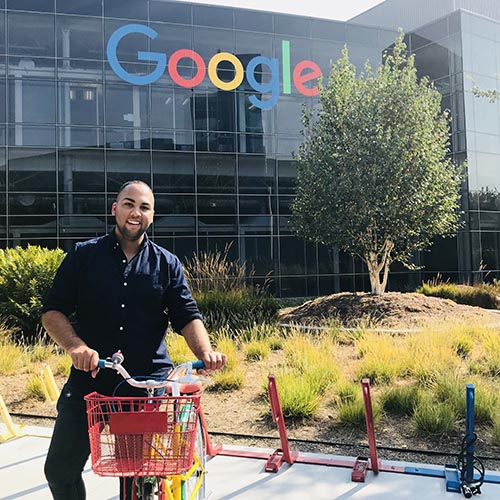
Jonathan Jean-Pierre ’15
Africana Studies and Global Studies
Jean-Pierre’s upbringing in Brooklyn was a testament to resilience. His mother worked tirelessly, often juggling two jobs at a time, to give him and his siblings opportunities to succeed. These sacrifices instilled in him the importance of character, a college education, and the grit to work toward his dreams every day to support his community.
With support from the Fiver Children's Foundation, a nationally recognized youth development organization in New York City, Jean-Pierre not only honed his leadership skills but also formed lifelong bonds. Fiver's one-of-a-kind 10-year commitment provides year-round mentorship and out-of-school programs, college access support, and a two-week overnight summer camp experience, all steeped in social-emotional learning in youth development. The Fiver program supported him and his peers to succeed in school, careers, and beyond.
During Jean-Pierre’s senior year of high school, a Fiver-sponsored college road trip brought him to Lehigh, where he immediately felt connected to what would soon become his second home on South Mountain. Inspired by a Fiver alumnus, Fitma O’Connor ’12, already studying at Lehigh, he applied and was accepted. Despite the initial inequities Jean-Pierre observed on campus and adjustments to the academic rigor, Lehigh's learning environment challenged him to grow as a leader and understand how he could make a positive impact, both at Lehigh and in the world.
Jean-Pierre's leadership experience at Lehigh was impactful. He immersed himself in campus life, participating in varsity rowing, student government, admissions, Greek life, and the university’s flagship Global Citizenship Program. He participated in off-campus immersions in Spain, Kenya, and Malaysia through Lehigh and the Department of State’s Gilman International Scholarship, applying what he learned to enhance the Lehigh student experience. This work led to his selection as a Nike Be True fellow in partnership with Campus Pride. The fellowship allowed him and college athletes to advance LGBTQIA+ inclusion in sports and meet with the Obama Administration in the White House. He also received a Teach for America fellowship, which he used to help lay the groundwork for reinstating the Posse program at Lehigh in 2017.
His commitment to DEI continued at J.P. Morgan, a dream job secured partly through the Lehigh alumni network. While there, Jean-Pierre earned a master's degree in human resources from Temple University and led global LGBTQIA+ inclusion efforts on the Pride employee resource group. Google, where he had previously completed an internship while at Lehigh, soon recruited him. At Google, he led several company efforts in the Office of the Chief People Officer, from helping land some of Google’s racial equity commitments to shaping the company’s first multi-year HR transformation strategy to help Google attract and grow what the company considers to be the world’s most innovative workforce.
In addition to his professional pursuits, he is pursuing an MBA at Duke University, a place known to Lehigh fans for a memorable men’s basketball upset. At Duke, Jean-Pierre is the DEI graduate student government director, driving DEI initiatives across the university. Coming full circle, he currently serves on the board of directors at Fiver. As one of the first alumni in this role, he has made a large impact, raising $150,000 in donations to support youth programs and scholarships and championing Fiver’s award-winning people & DEI strategy under his leadership.
Through the impact of a Lehigh education, along with Fiver, Jean-Pierre will continue to pave the way for others, leaving a lasting legacy of leadership, equity, and service.
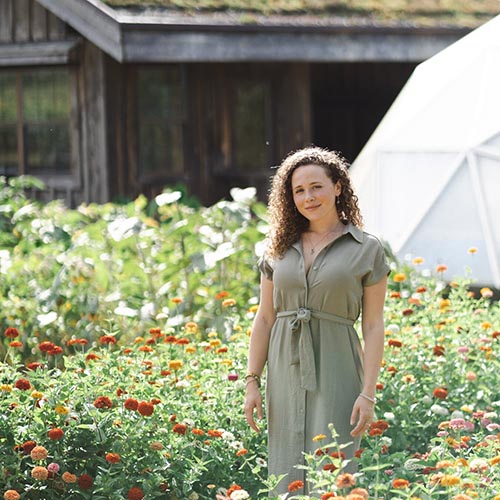
Nadine Clopton ’19 ’20G
Political Science and Health, Medicine and Society B.A.; Environmental Policy M.A.
Clopton works at the intersection of soil health and human health. It combines a web of thinking among environment, politics, nutrition, agriculture, and public health. Currently, each of these systems has a deep need for tending. Reimagining and reconnecting them is at the heart of Clopton’s mission. Through conscious leadership, her work allows her to innovate and advocate for healthier ecosystems, food systems, and social systems. Getting to this point was a journey of mind, body, and soul.
At Lehigh, she became involved in the United Nations. First, Clopton served as a UN youth representative on behalf of an Australia-based NGO, Caring and Living as Neighbours, which is where she honed her skills in advocacy and public speaking. Her advocacy efforts centered around improving global public health and combating climate change. She co-authored the Global Youth Climate Action Declaration.
Concurrent to her studies, Clopton served as a youth chair on the board of the Global NGO Executive Committee, a 60-year-old organization serving as a liaison between the UN and over 1,500 NGOs. Her age provided an intergenerational perspective on issues and prompted others to encourage her to run to become a director on the board, the first young person to do so in the organization’s history. She won a seat and later served as vice president. When the president suddenly passed away, she stepped into the role of leading and advocating on behalf of civil society around the globe. Her work at the UN lasted seven years.
Clopton navigated some chronic health issues of her own that pushed her beyond the walls of conventional Western medicine. Through her healing journey, she developed a passion for holistic health practices and using food as medicine, transforming her health for the better.
Along the way, Clopton embarked on a quest to clarify her soul’s purpose. The pandemic provided the perfect backdrop for this inner work and to put her hands into the soil, studying with an herbalist. That’s where she felt how systematically disconnected people had become from both nature and food. Meditation, journaling, and virtual sessions through a six-month inner dive with the Purpose Guides Institute soon led her to the founding of Conscious Consulting, LLC, where she facilitates workshops and leadership training centered around defining and aligning with core values.
Currently, in her role as regenerative education program manager at Rodale Institute, she works to bridge healthcare and regenerative organic agriculture. She has developed Rodale Institute’s annual Regenerative Healthcare Conference — a retreat-style gathering at the nexus of food as medicine, soil health, and human health. The program is the first of its kind — convening doctors, nurses, health practitioners, hospital leadership, food systems innovators, and farmers looking to co-create a regenerative healthcare system by shifting how we source our food. She also manages the institute’s consumer education initiatives.
To feed her own soul, she practices yoga, cooks, writes, and sings. As a teen, she began her training in classical opera. She selected Lehigh because she knew she could continue to develop as a vocalist at a conservatory level while having the freedom to pursue another major. While at Lehigh, Clopton performed in the choir and a cappella — it’s where she found her community on campus. Today she is a member of the choral union, where community members join students on stage. She’s lucky enough to be able to perform alongside her sister, who is a rising senior.
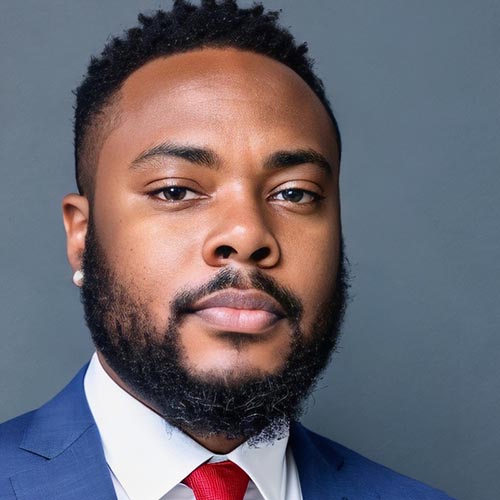
Jamal Connelly ’19
Political Science, Religious Studies, and Africana Studies
When an admissions counselor from Lehigh came to Connelly’s high school in Philadelphia, Connelly and his twin brother applied early decision straight away. Both were accepted and soon spent a weekend on campus for in-depth discussion and a tour. They loved it from the start.
Both participated in Lehigh University Student Scholars Institute, a pre-orientation program that seeks to inspire and support students who identify as first generation, low income, and/or are from an underrepresented group to become confident and successful leaders on campus and beyond.
Connelly felt supported at Lehigh to grow, receiving the tools he needed to succeed and take on the world. The world, it seems, was at his doorstep. Over his four years, he traveled to Toronto for the World Religions Conference, to Israel and Palestine for inter-religious dialogues, to Rome as an Iacocca Summer Intern, and to Ghana for a globalization and health course. He gained a global perspective through this range of professional opportunities.
After graduation, Connelly spent two years in Brooklyn as part of Teach for America. At his high school, he taught advanced placement courses in U.S. history and world history and also served as a college counselor. He loved teaching and helping students find college placements that would alter the course of their lives.
While Connelly knew from a young age that he wanted to help people, he shifted direction when he entered law school at Temple. As he begins his final year in the program, he has worked hard in a few different areas but has zeroed in on housing. As any Lehigh student might, he has explored housing law from a few different vantage points. At a legal services office, he worked with families facing eviction. That experience was powerful as he sought to keep families in their homes. He then worked to help the city address buildings in need of repair, demolition, and code enforcement. He often faced the same judges but stood on a different side of the table. Both experiences had him working to help a city he cares about.
Philadelphia, after all, is his home. His brother now works as a teacher there. Together they share an apartment. Connelly wants to ensure that the neighborhoods are clean and safe as people live, work, and raise children. That’s why he volunteers his time monthly to help clean up blocks in the Kensington neighborhood that has been hit hard by the opioid epidemic. This is what dignity and respect look like in a place that he loves.
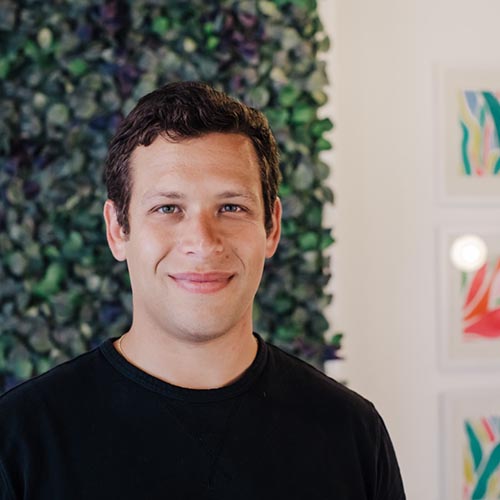
Adam Goldstein ’16 ’17G
Finance
When the Mountain Hawks bested Duke in the NCAA men’s basketball tournament, it helped make the name Lehigh feel more real for Goldstein. He was a first-year student at a university in Vermont and wanted to transfer. He wasn’t feeling challenged enough and sought a higher-caliber business education. Lehigh was on his list. The upset win in basketball made him explore more of what Lehigh offered. Soon his transfer was complete. At his first career fair that fall, his selection was confirmed when he saw the Big Four accounting firms all in attendance and vying for Lehigh talent.
That first year on South Mountain, Goldstein put his leadership skills to a test. He was named captain of the hockey team halfway through the season. Senior players would have to take direction from a sophomore who sought to change the culture of the team and build greater momentum. By his senior year, the team won its first playoff game and made it to the championship.
While he took many lessons from this experience, what remained with Goldstein was the idea that life meant doing the work you were passionate about while also creating space for personal passions. It made sense for a student who earned his real estate certificate, minored in entrepreneurship, and could have minored in music. By the time his senior year rolled around, he had an offer in hand for a rotational program at a notable industrial manufacturer. He decided instead to pursue a master’s in technical entrepreneurship. He was glad he did. During that year, he landed an offer at EY — the only job he had ever dreamed about.
While working in real estate at EY was meaningful, Goldstein’s role lacked an entrepreneurial component. He had lots of ideas for new approaches and varied iterations, but it became clear that ideas flowed down from the top.
A seminal moment came when Goldstein attended Ozy Fest, a two-day festival in Central Park that brings together a diverse group of performers and thinkers. At a lecture by Malcolm Gladwell, Goldstein was selected, by chance, to ask him a question. Goldstein was at a crossroads — he had a job he had dreamed about yet held a desire to be an entrepreneur. Which would be a larger net positive? Gladwell told the audience that we owe it to ourselves to go out and try, that what we are here for is to put our best foot forward.
Goldstein took the answer to heart and was soon at a real estate startup called Manage by Q. When the business was acquired by WeWork, Goldstein moved to an office furniture startup called Branch — he was its first operations employee and worked to build out its domestic supply chain. When COVID-19 hit, the company took six weeks to shift its business operations from B2B to B2C. It worked, and the company now has a 60-person team.
Still, Goldstein wanted to start his own venture and kept returning to an idea he formed while sitting in one of Lehigh students’ favorite coffee shops: Saxbys. How might he create a comfortable and congenial shared office space? WorkBistro was born … well, after Goldstein and (soon-to-be spouse) Abby Farrell ’15 ’16G sold his car and moved to California and after he found a short-term lease that would allow him to test his business model.
On the first day WorkBistro was open, Goldstein made $5 from a drop-in co-worker. After a bit of marketing, he had more people sharing space. A pivot to a membership model yielded even more co-workers. Then something happened that altered his direction: Someone called and asked to book the space for a baby shower. After the addition of a few furnishings and homey touches, events were now an option. Soon event bookings were outpacing co-workers.
By 2022, WorkBistro grew enough that Goldstein shifted to part time at Branch. By May 2023, Goldstein, thanks to his wife, recognized that the co-working aspect of WorkBistro's business had run its course. Sway was born, a new way to manage events where the Sway team and its growing platform become the connective tissue between client, venue, and vendor. It blends Goldstein’s love for physical spaces, entrepreneurship, tech, service, and community. These are the same things that he speaks to Lehigh students about when they reach out via Lehigh Connects or participate in Lehigh Silicon Valley.
True to form, as a person focused on the future, Goldstein has built Sway so it can scale, and if all goes according to plan, it may soon manage an event near you.
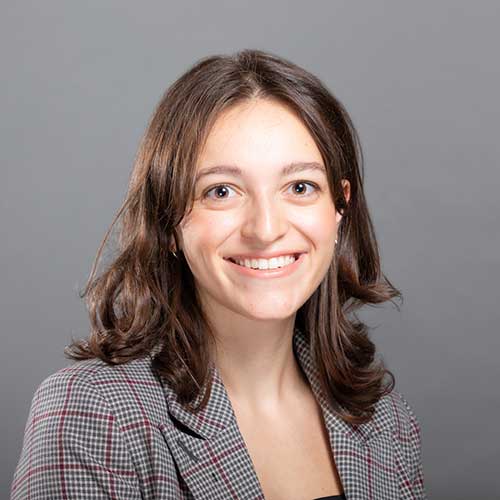
Julia Pardee ’21
Business Information Systems and Marketing
When Pardee was considering Lehigh, she went to accepted students day and was planning to attend a law class. When that was canceled, she reluctantly joined an accounting class. By the end of the session, not only did she know Lehigh was the perfect fit for her, she also knew that she’d be taking a course with that accounting professor who had the ability to turn a subject she had little interest in into something beyond compelling.
Following that starting point, she jumped into Lehigh with both feet and has been well recognized and awarded along the way: dean’s list, an Asa Packer Walking Stick for leadership, the Nelson Leighton Bond Memorial Prize for a junior business major, marketing honor society inductee, and business honor society inductee.
Pardee served as student senate president, Technology, Research, and Communication writing fellow, orientation leader, and Soaring Together adviser for the 50th anniversary of coeducation. But what she talks about the most are the entrepreneurial experiences: Tauck Scholars Program, Lehigh Silicon Valley, and Global Entrepreneurship Fellowship. Through these opportunities she learned, networked, and discovered her future career path. One internship was at a Dutch startup where she rebranded and redesigned its website. Another was at a San Francisco startup where she developed a product positioning strategy. COVID-19 took away a startup opportunity in Paris, so she jumped into a venture fund internship where she helped cybersecurity startups launch and supported their marketing strategies.
That opportunity prompted her to take a venture capital course during her senior year. She liked how venture funding is at the forefront of technology. That is where she began her post-Lehigh career at Cyber Mentor Fund, which works with the most impactful leaders, operators, and venture capitalists in cybersecurity. After three years, she joined Munich Re Ventures, a global investor supporting climate, privacy, cybersecurity, energy, and transportation technologies. In both of these roles, Pardee has met with hundreds of startups and helped source and execute dozens of investments in early-stage companies.
Her passion for and pride in Lehigh makes her want to serve students in the same capacity as the alumni who helped her. She remains active on the West Coast with Soaring Together, regional events, Young Alumni Council, Lehigh@NASDAQ, and individual student mentoring. And the connections with amazing Lehigh people happen in and out of the office. Case in point: Her Lehigh water bottle helped forge a connection during a recent session at her hot yoga studio.
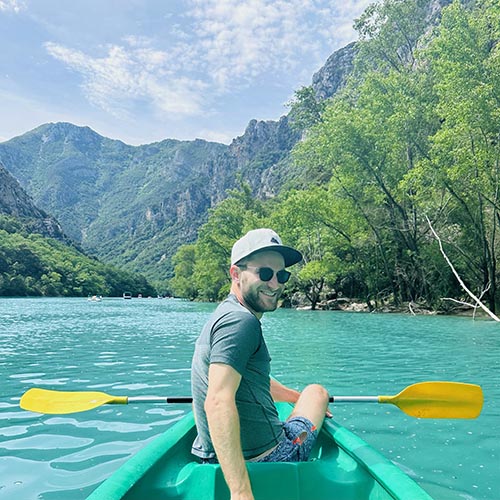
Dean Kroker ’16
Computer Science and Business
When Kroker was 14 years old, he canvassed the neighborhood, offering to repair computers, printers, and BlackBerry mobile phones. Did he know how to fix them? No, but he knew how to use Google and get it done. By the time he was 16 years old, his company, Whitemarsh Technology, was pulling in thousands a week and had several hundred clients. He employed seven to 10 of his buddies — each had an interesting title and worked on a range of projects, like computer repairs, website builds, photo scanning, video editing, and more.
Money was a sensitive topic for Kroker’s family, especially following a divorce; it pushed Kroker to make and spend his own money. Like a typical teenage boy, he’d blow it on frivolous things like the latest iMac, digital camera, and Dolby surround sound. He still put some away to trade the stock market and used much of it for his education. Clients continued to call him for help into his sophomore year at Lehigh. That’s when he sold the book of business to another hungry teenage entrepreneur.
By that time, he had moved on to his next business venture, Endless Tone, a musical instrument price-comparison website. Kroker is a guitarist and had bought a sweet axe. He noticed an opportunity in this vertical when navigating clunky websites, difficult search comparisons, and no helpful applications. Through programs at Lehigh and the city of Bethlehem, he raised six figures in investments and grants to get the company off the ground. For four years, he and his college pals worked to make Endless Tone a reality. The company ultimately failed, mainly when Kroker and his co-founders — Don Scott ’17 and Greg Potter ’16 — went on to build other things. The process of building this company made Kroker who he is today.
After graduating, Kroker joined a startup as its sixth employee that specialized in cloud and data platform solutions using Microsoft’s Azure platform. That company was acquired by Hitachi Solutions in 2019. Microsoft was so impressed with Kroker’s deep understanding of Azure that he soon joined its team in Seattle.
By 2023, Kroker had the itch and ideas to start his own ventures again. One is off and running: Western Hemlock, a team of friends (no surprise) who all are former big tech employees and consult with notable companies like Lyft and Google on a range of projects including technology architecture, product design, and AI tools. The other company uses niche iOS tools to help social people like Kroker strengthen their existing friendships and build new ones.
Friendships have always mattered to Kroker. Several Lehigh friends have worked alongside him at jobs and startups. Kroker likes to build things with friends and leverage their smarts to challenge himself and create things that impact the world. He has a high tolerance for risk and doesn’t fear failure. It helps that he tries to do work he loves with people he loves. He extends that love to many Lehigh students via Lehigh Connects … so his network of friends continues to grow.
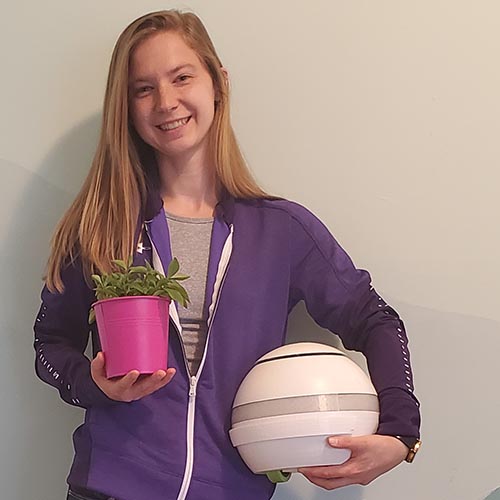
Deanna Kocher ’17
IDEAS
Kocher grew up with the mantra of “carrying fun in [her] pockets.” She kept this idea with her and had long known that she wanted to be an engineer, but the playfulness and creativity brought out by “keeping fun around” also opened her up to being more. Lehigh’s IDEAS program made that possible, allowing her to combine mechanical engineering, product design, and child development. Her hope: to design toys that inspired future generations and future engineers.
Kocher found ways to employ this love of play and “playful learning” through her Lehigh career and beyond. PVC pipes became temporary toys in Cebadilla, Nicaragua, where Kocher traveled as a lead on the Engineers Without Borders team. This playfulness not only helped build meaningful relationships in the community, but it also helped her to train the community to maintain the water distribution system they were there to install. She was empowered by the social impact of engineering and how play could serve as a universal language.
As Kocher navigated her career, the focus on playfulness turned into a theme of social impact and human-centered engineering. While in the IDEAS program, she focused her coursework on accessible STEM-based play, but her extracurriculars (like Engineers Without Borders) focused on other meaningful avenues of technology. If you’ve been to Alumni Memorial recently, you’ll find a desk that was designed in tandem with facilities and staff while still being in homage to Lehigh’s renowned architecture. Her investment was in play, but she put people at the forefront of all of her engineering activities.
After a year in industry, Kocher returned to school for a Ph.D. in mechanical engineering at Cornell — where she would be able to dedicate herself to working on developing toys at the intersection of child development and engineering. She built a number of robots and toys in her time at Cornell, including a room-scale exhibit where children learned about making maple syrup with a robotic “forest creature” named Maple and a goofy R2D2-esque robot that helped children take plants. Inspired by these ideas, she took the time to develop an environmental education bot that was a finalist in the Future Play Design Challenge.
Caught off guard by the chance to pivot to a potential startup, Kocher found herself evaluating her career opportunities. A few months later, Cornell offered her an engineering position with its hardware accelerator programs. She now spends her days working with startups to move them through the product development process and help them launch scalable products. She finds that the startup space aligns closely with play — the energy surrounding innovation is always playful, exciting, and new. She has worked with over 50 startups and recently took a position teaching in the engineering school, where she emphasizes user-centered mechanical engineering.
Kocher continues to develop and make robots and toys with a focus on following her passions. Keep your eye out for a Kickstarter someday that helps put fun in everyone’s pocket.
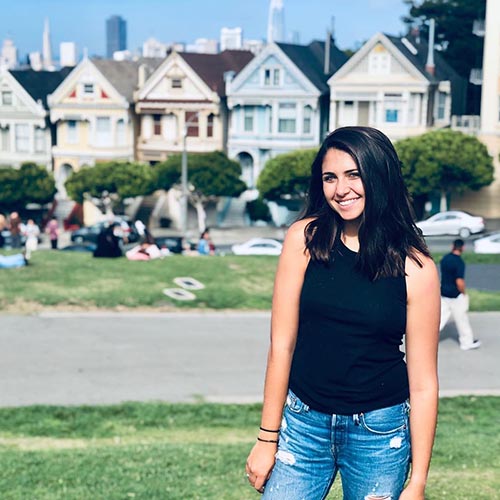
Diana Nicholas ’19
Marketing
Nicholas spent her younger days literally looking up to Lehigh: She could see South Mountain in the distance from her backyard. For this Bethlehem native, the campus was a regular destination for summer camp. She was immersed in the South Side arts as part of Pennsylvania Youth Theatre, starring in 20 main stage productions over the years. She even knew her favorite Goose sandwich (Turkey Gander) before attending Lehigh.
She also knew Lehigh was prestigious in a range of academic areas. Her vocal talents had her considering a music major, but Nicholas enjoyed the entrepreneurship courses she took in high school and running the social media accounts for her school’s chapter of the Future Business Leaders of America. She applied early decision to the College of Business to pursue a major in marketing and minor in entrepreneurship.
Of course, Nicholas was in the marketing club, but she also sat on the executive board of her sorority, judicial board of the panhellenic council, and executive board of university productions, tasked with bringing live entertainment to campus. But her life changed during her junior year when she participated in Lehigh Silicon Valley.
While in the Bay area for the 10-day intensive program, Nicholas had the opportunity to immerse herself into numerous companies, meeting CEOs, founders, and executives at startups and big tech. During the program, Nicholas sat next to a cybersecurity CEO who was a speaker for the students. He spoke of the importance of investing in relationships when networking and life at a startup in a more transparent and blunt way than some of the others they had met throughout the course. Working at a small and scrappy startup appealed to her more than the traditional career path.
Later that year, the same CEO returned to campus to speak with students. Nicholas attended and took him up on an offer he made to everyone about shooting him an email about an internship at his startup, vArmour. She sent a very long email, which Nicholas now recognizes, but the CEO replied. Soon she was talking to the head of operations. Soon after that, she was trying to figure out how to walk back her acceptance of an internship at another company and find housing in San Francisco for the summer.
The cheapest option after a lengthy search was an Airbnb near Google headquarters. She’d have to share a room. Only when Nicholas arrived was it clear that sharing meant there were 23 people living in the place. It was a hacker house, filled with millennial tech-obsessed engineering minimalists. She shared a bedroom with the three other women who called the place home and one bathroom for 12 of the housemates. Sorority life more than had her prepared.
The people in the house helped Nicholas as she faced a steep learning curve in cybersecurity. As a marketing intern, she had to understand the tech in order to sell the tech. She’d research and work by day and break down that information with her housemates by night. It did the trick. She continued to work for the company during her senior year.
When she graduated, Nicholas had an opportunity to continue that work and headed back to San Francisco, where she focused on event marketing and building alliance partnerships with companies like AWS and Microsoft. She leaned into it and gained a strong sense of the business.
With great lessons, after five years at the company, Nicholas left in December of 2022. In March of 2023, she co-founded a new startup called Anetac with $16 million in funding. Prior to building the company, she and her co-founders interviewed over 40 security executives to validate the problem and the product market fit. The company officially launched out of stealth in May and is positioned as the leader in identity vulnerability and security.
While cybersecurity may dominate her workdays, music, which was such a mainstay in Nicholas’ early life, is back. She sings and plays piano, opening for major acts in the Bay area and performing at local bars. Despite finding new haunts, she still visits the old standbys. She is active with students at Lehigh@NASDAQ, returns to South Mountain for Reunion (having chaired her five-year reunion committee), and tries to grab a Turkey Gander when in town.
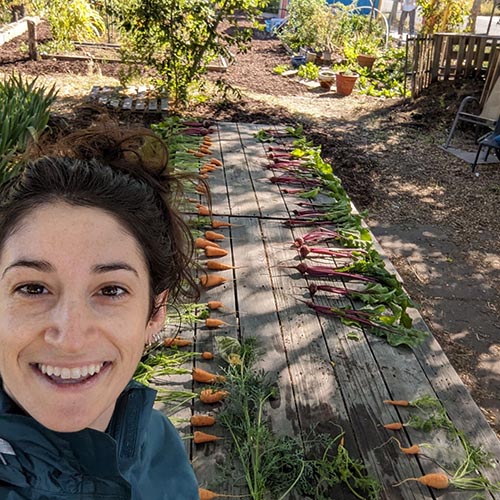
Mimi Bestwick ’14
Finance
Bestwick was on a traditional path, moving through the early career stages at Prudential when a profound family crisis catalyzed change. She decided that her life would have more meaning if she focused on creating collective opportunity rather than individual wealth. So she left her job and moved to the city of angels to enable transformation. Joined by her mother, two sisters, brother, and partner, Bestwick soon entered the MBA program at the UCLA Anderson School of Management. She selected it because of its focus on social impact entrepreneurship.
Over the two years, Bestwick was a leader as she served as president of Anderson’s Net Impact Club, an organization focused on using business skills to effectuate impact, and as a leader of Anderson Venture Impact Partners, a student-led impact investment fund.
She worked at the ECMC Foundation, whose goal is to improve higher education among underserved populations through evidence-based innovation. She managed an impact investment portfolio focused on fueling female founders. While she enjoyed helping bring an entrepreneur’s dream to life, Bestwick wanted to get closer to the ground level where she could be part of the action, strategizing, building partnerships, growing a team, and leading change.
She again took a moment to pivot — soul searching for a new opportunity. That arrived in the form of food rescue. She had been volunteering at a local community garden and compost program and learned about food recovery — rescuing quality surplus food from the waste stream and redistributing it to those experiencing food insecurity. Bestwick identified Replate as an innovator in the food rescue space, and what was originally planned to be a gig opportunity rescuing food turned into a full-time role writing grant proposals. Within a few months, she evolved into a lead capital advocate and shortly thereafter became Replate’s CFO. That last jump came when she helped the organization find a way to scale its model by partnering with a strong network of food recovery organizations.
This sense of leadership and insight is something that Bestwick honed at Lehigh. Her experience at the university helped her elevate her sense of self — what she could take on and accomplish. She started to aim higher, push harder, try new things, build networks, and create shared value. That sense of leadership came through the culture of excellence in Gamma Phi Beta, where she learned that being exemplary means bringing others with her through collaboration and mentorship. This momentous journey in such a short time fills her with immense gratitude as she looks back on her high school years waiting tables at the Friendly’s in Reading, Pennsylvania. She’s a firm believer in letting the universe guide a path toward shared opportunity.
